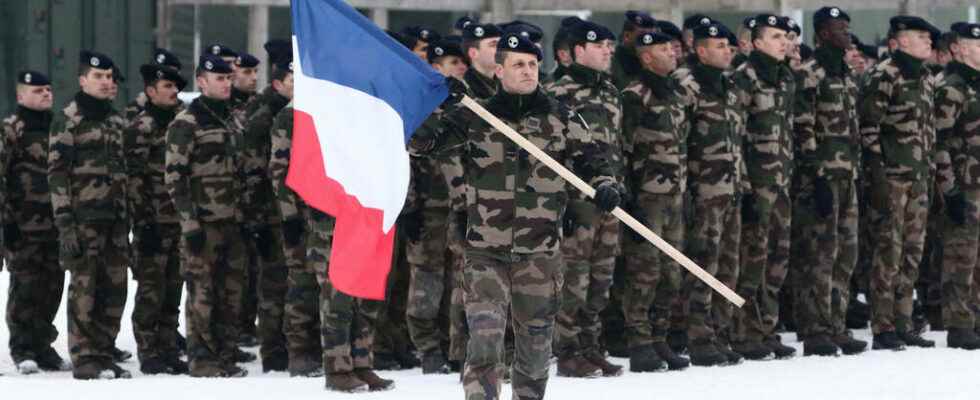The war in Ukraine pushes Western countries to look into the state of their armed forces and puts the importance of Defense at the heart of the French presidential election. Here is what the two qualified candidates for the second round offer in this regard.
Last February, the report of the defense committee of the National Assembly had marked the spirits, indicating that if France, seventh military power in the world, went to war, it would run out of means and ammunition after two weeks.
Means, the two candidates qualified for the second round of the presidential election precisely want to give them to the armed forces, but the priorities are totally different.
Emmanuel Macron: modernization and European revival
Candidate for re-election, Emmanuel Macron intends to keep his promise to maintain the defense budget at 2% of GDP by 2025. This threshold, exceeded in 2020, is a commitment made by NATO members. It has long been lacking in France, and more broadly in Europeans.
Thus, in 2022, the budget for the armies was increased to 41 billion euros, up 1.7 billion compared to 2020. Even greater increases, of the order of 3 billion euros, are planned. from next year. Objective: to reach 50 billion in three years.
In the extension of the Military Programming Law (LPM) 2019-2025 – known as “ repair and preparation for the future –, this increase in the budget will go massively to the modernization of the French forces. A modernization that will involve a renewal of equipment – 60 additional Rafale fighters, five new nuclear submarines – and an effort focused on innovation, with the development of new weapons: “ electromagnetic weapons, optical camouflage for combat vehicles, underwater drones, hypersonic missiles, space surveillance nano-satellites is it listed in his program.
For the outgoing president, this emphasis on Defense can only be conceived within a European framework. The construction of a Europe of Defense remains at the heart of its program. He reminded him again last march 2, at the beginning of the Russian invasion of Ukraine. To build it, the European Union must ” invest more to depend less on other continents and be able to decide for itself “. Europe” must now agree to pay the price of peace “. The European summit, convened a few days later in Versailles, did not give birth to a real revolution: if for the first time, arms deliveries – in this case to kyiv – were decided at European level, the management took place at the state level.
But the long-term effort, which Emmanuel Macron wishes to support in a second five-year term, essentially concerns the orientation of the investments of the Twenty-Seven towards the European defense industry. He partially succeeded in this at Versailles: Brussels must present, before the summer, an inventory of gaps and opportunities in this area. For the Head of State, the development of joint armament programs such as the plane and the tank of the future (the Scaf and the MGCS) with Germany remains the backbone of this strategy.
► Also to listen: The Scaf, fighter plane of the future, on the runway
Marine Le Pen: military conditions and exit from NATO’s integrated command
Taking the opposite view of her adversary, Marine Le Pen intends to close the door to these two structuring industrial projects and militates in favor of a military “reindustrialisation” in France only. “ We must stop cooperation in the arms industry, because it does not workshe said again last week on BFMTV. The philosophy of Germany is too different from that of France to achieve something that is efficient and coherent. »
She thus wishes the return to a major national arms policy “, through investments in the strengthening of skills within the French sector, and the promotion of exports, despite “ attempts by NGOs to [les] to prevent “.
Promotion, also, of professions, and more broadly of the image of the armies: reassessed balances and bonuses, strengthening of support for families, ” improvement in clothing and diet », return to the great military celebrations… Marine Le Pen pampers here an electorate that is won over to him. With her, the “Grande Muette” will be less so: “ Respect begins with the recognition of the intellectual contribution of the military to the debates of the City. […] The French armies must be able to express themselves not only on their profession, but also on broader areas “, can we read in his program.
In general, like her rival, the candidate supported by the National Rally wants a significant increase in the budget of the armies, to reach 55 billion euros by 2027. But here, there is no need to comply with the commitments made within NATO, of which it precisely wishes to leave the integrated command, and this, as of this year. This flagship proposal of its program was already included in that of 2017.
With this gesture, Marine Le Pen intends to put France on a point of balance between the United States and Russia, and at the center in a world that has once again become ” multipolar “. And this, even if the exit from the integrated command does not detract from the commitments made by France within the organization. She also advocates, once ” the Russian-Ukrainian conflict ended », a rapprochement between the Atlantic Alliance and Moscow. A position assumed on the eve of the second round, but difficult to hold in the current context, while the far-right candidate is still the subject of criticism for her past acquaintances with the regime of Vladimir Putin.
